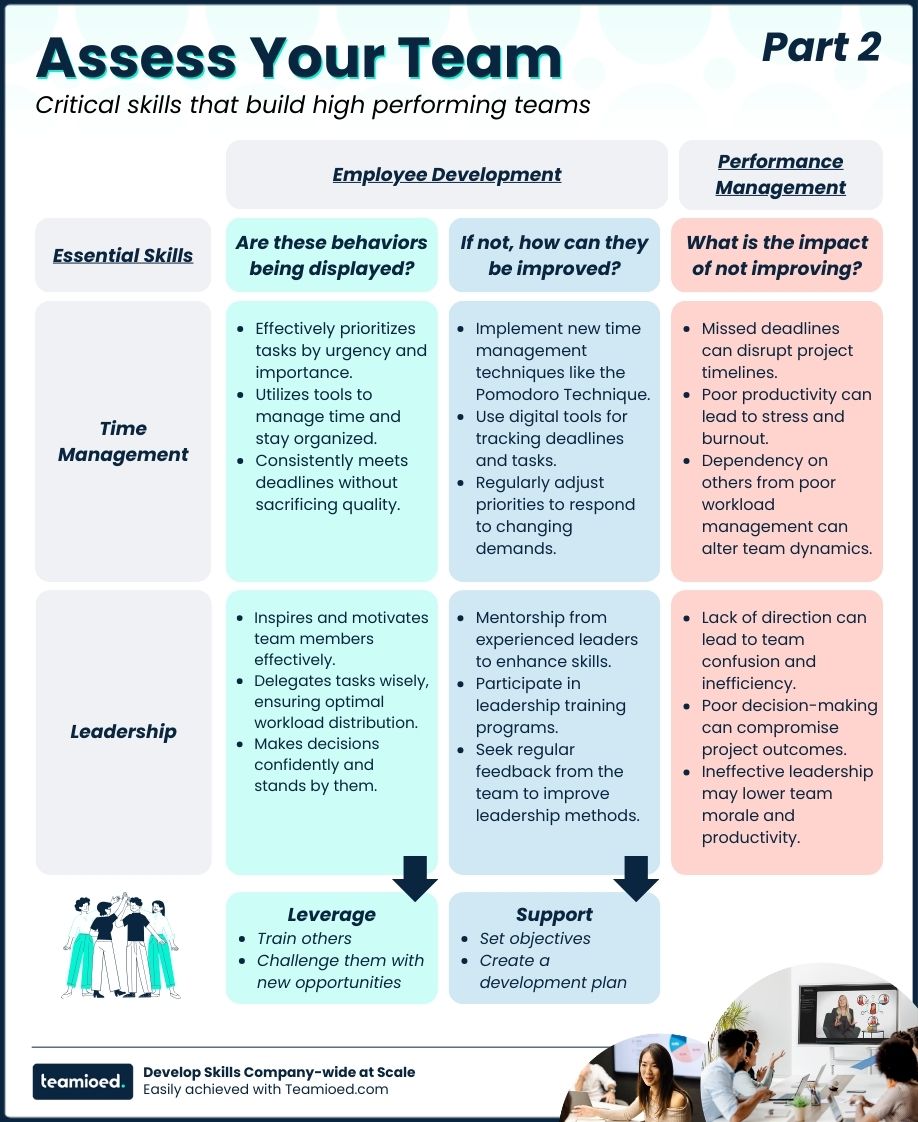Ben Kill, Chartered MCIPD
How to Assess Your Team (Part 2)

Continuing the assessment and development of critical skills within your team is essential for sustaining high performance and growth. In Part 2, we'll focuses on two additional fundamental skills: time management and leadership.
Effective time management is crucial for any high-performing team. Team members should be able to properly prioritize tasks by urgency and importance, thus ensuring that critical tasks are completed on time. Utilizing tools to manage time and stay organized is also key to maintaining productivity and meeting deadlines consistently without sacrificing quality. If these behaviors are not being displayed, team leaders can foster improvements by implementing new time management techniques like the Pomodoro Technique, using digital tools for tracking deadlines and tasks, and regularly adjusting priorities to respond to changing demands. Failing to foster good team management can lead to missed deadlines, poor productivity, and dependency on others due to poor workload management. Any leader can tell you that this can quickly alter team dynamics and cause a lot of unnecessary friction.
Leadership is another essential skill for high-performing teams. Effective leaders help inspire and motivate team members, fostering a positive and productive work environment. They also delegate tasks wisely, ensuring optimal workload distribution, and make decisions confidently. If these leadership behaviors are not being displayed, improvements can be made through mentorship from more experienced leaders, participating in leadership training programs, and seeking regular feedback from the team to refine leadership methods. Without good leadership, teams may suffer from a generalized lack of direction, leading to confusion, inefficiency, and poor decision-making, which can compromise project outcomes.
Whether you're the leader, a manager, or just team member, it's essential that you try to train and mentor one another in time management and leadership skills. You should also seek to provide new opportunities and challenges to help your teammates apply and further develop these skills.
Effective time management is crucial for any high-performing team. Team members should be able to properly prioritize tasks by urgency and importance, thus ensuring that critical tasks are completed on time. Utilizing tools to manage time and stay organized is also key to maintaining productivity and meeting deadlines consistently without sacrificing quality. If these behaviors are not being displayed, team leaders can foster improvements by implementing new time management techniques like the Pomodoro Technique, using digital tools for tracking deadlines and tasks, and regularly adjusting priorities to respond to changing demands. Failing to foster good team management can lead to missed deadlines, poor productivity, and dependency on others due to poor workload management. Any leader can tell you that this can quickly alter team dynamics and cause a lot of unnecessary friction.
Leadership is another essential skill for high-performing teams. Effective leaders help inspire and motivate team members, fostering a positive and productive work environment. They also delegate tasks wisely, ensuring optimal workload distribution, and make decisions confidently. If these leadership behaviors are not being displayed, improvements can be made through mentorship from more experienced leaders, participating in leadership training programs, and seeking regular feedback from the team to refine leadership methods. Without good leadership, teams may suffer from a generalized lack of direction, leading to confusion, inefficiency, and poor decision-making, which can compromise project outcomes.
Whether you're the leader, a manager, or just team member, it's essential that you try to train and mentor one another in time management and leadership skills. You should also seek to provide new opportunities and challenges to help your teammates apply and further develop these skills.
Want to learn more? Teamioed specializes in technology-led team experiences that empower managers to run their own team development sessions. We’ve specifically designed these discussions to complement existing meetings and create minimal disruption whilst enhancing team cooperation, efficiency, and engagement. To learn more about Teamioed’s low-cost, subscription-based platform, click here.
Explore
Legal notice: Teamioed
Limited is a limited company registered in England with registered number
14441318. Our registered office is at Suite 2453 Unit 3a, 34-35 Hatton Garden,
London, United Kingdom, EC1N 8DX. For information about how we process data and
monitor communications please see our Privacy policy and for terms of use
please see our Terms and Conditions. Our
website has been prepared for general information only and you should always
obtain professional or specialist advice before taking any action on the basis
of the content of our website or our products or services. No rights are to be derived from any proposal contained on
our website and a licence cannot be deemed granted by us until a written
agreement containing all necessary terms and conditions is fully negotiated and
executed between the relevant parties.
All logos and trademarks are the property of their respective owners and are used for informational purposes only. We are not affiliated with, endorsed by, or sponsored by any of the companies represented by these logos.
All logos and trademarks are the property of their respective owners and are used for informational purposes only. We are not affiliated with, endorsed by, or sponsored by any of the companies represented by these logos.
© Teamioed 2026
Secured with SSL

Write your awesome label here.
Write your awesome label here.

